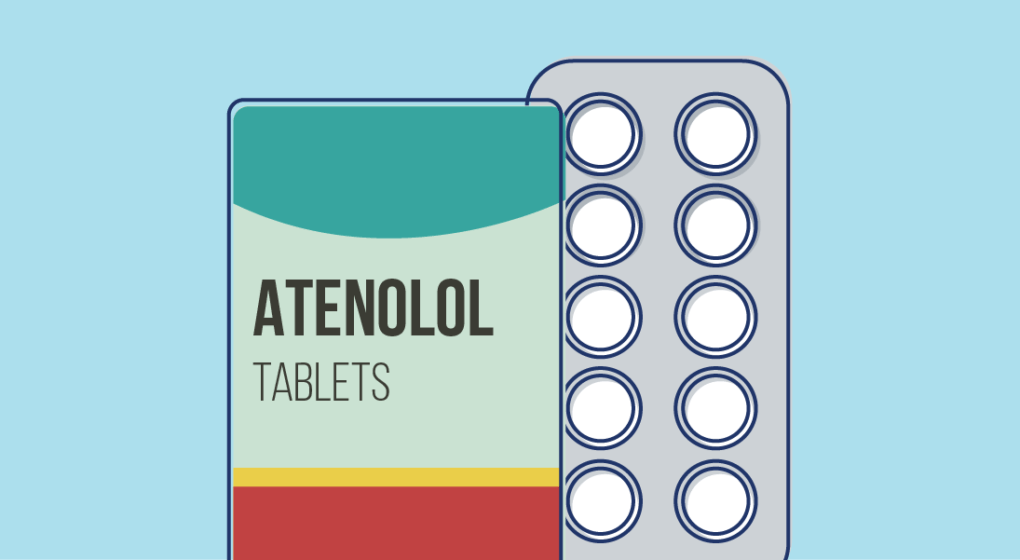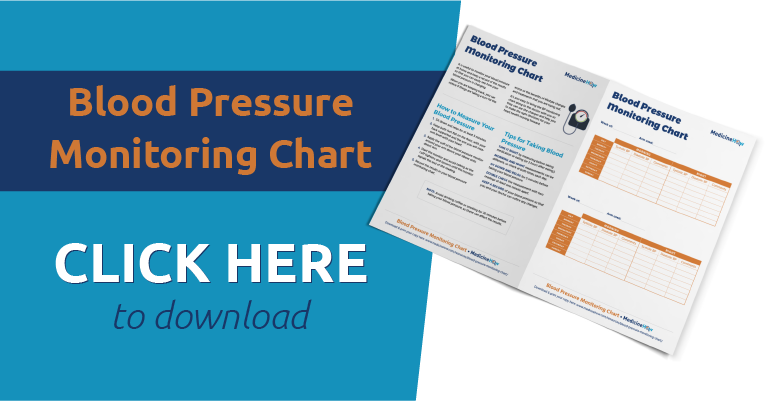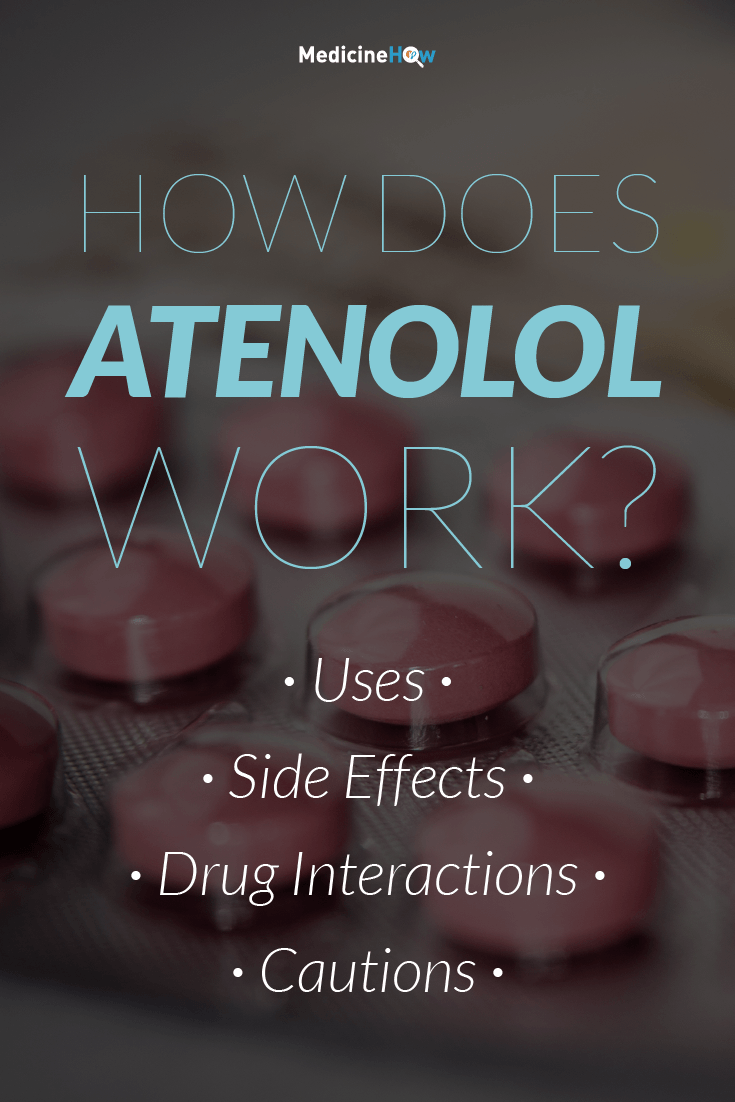
Atenolol is a type of drug called a beta blocker that can help to lower your blood pressure by blocking certain receptors in your heart. It works by reducing the rate and force of your heartbeat, which reduces the pressure of the blood pumping around your body.
If your doctor has recommended that you take atenolol to reduce your blood pressure, it’s worthwhile for you to know a little about how it works.
Brand Names and Doses
![]() Atenolol is what we call the generic name – the name of the active drug in the medication. There are many different drug brand names that contain atenolol, so the medication you need might be called something slightly different, such as:
Atenolol is what we call the generic name – the name of the active drug in the medication. There are many different drug brand names that contain atenolol, so the medication you need might be called something slightly different, such as:
- Noten
- Tenormin
- Tensig
All of these brand names contain atenolol and they all do the same thing. They’ve just got different names because they are made by different pharmaceutical companies.
Each brand is available in a single dose of 50mg. These tablets have a score line in the middle, making them easy to break in half if you need a lower dose of 25 mg. Some people may need a higher dose of 100 mg daily, which they can do by simply taking two tablets.
If you’re just starting to take atenolol, your doctor might recommend you to take a low dose in the beginning as your body adjust to taking the medication. You can then increase the dose until you reach the optimal control of your blood pressure. This is a good idea to help reduce the risk of side effects you might experience when taking atenolol.

What type of drug is it?
![]() Atenolol is a type of drug called a beta blocker. This is known as a drug class, which is a group of medications that all work in a similar way. Other beta blocker drugs include:
Atenolol is a type of drug called a beta blocker. This is known as a drug class, which is a group of medications that all work in a similar way. Other beta blocker drugs include:
Even though they are all in the same class, there are a few subtle differences between them. What makes atenolol stand out?
Atenolol works specifically on B1 receptors found in the heart and has less effect on other B2 receptors found in other parts of the body, such as the lungs. This is a better choice for people that suffer from lung diseases, such as asthma, which may get worse taking other beta blocker medications.
Atenolol is also excreted almost completely in your urine via the kidneys. This means it is a great option for someone with good renal function (or someone with a bad liver, the other organ used to excrete many other beta blockers). Someone with poor renal function, however, may need a reduced dose or to use a different beta blocker drug.
How does atenolol work?
![]() The heart is critical in the cardiovascular system and is responsible for pushing the blood through your blood vessels and around your body. There are certain receptors that are found in your heart – called beta-adrenergic receptors – that send the message to the heart muscles, telling them to contract and push the blood out of the heart and around the body when they are activated.
The heart is critical in the cardiovascular system and is responsible for pushing the blood through your blood vessels and around your body. There are certain receptors that are found in your heart – called beta-adrenergic receptors – that send the message to the heart muscles, telling them to contract and push the blood out of the heart and around the body when they are activated.
Beta blockers stop this process from happening as normal. They attach to the beta receptors in the heart and stop the molecules that normally activate the receptor from taking hold.
The result? The heart muscles can’t contract and push the blood around the body as it usually does.
What happens in reality is the heart pumps less often and is less strong, pushing out a smaller volume of blood. This means that your heart rate and blood pressure will decrease when you take a beta blocker like atenolol.
For someone with high blood pressure (hypertension) this is a huge benefit because the blood pressure naturally decreases. This helps to relieve the stress placed on the heart and blood vessels, protecting you from cardiovascular events, like a heart attack or stroke.
What is it used for?
![]() The way atenolol (and other beta blockers) work make it useful in the treatment of several health conditions, including:
The way atenolol (and other beta blockers) work make it useful in the treatment of several health conditions, including:
- High blood pressure (hypertension)
- Chest pain (angina)
- Irregular heartbeat (arrhythmia)
- Heart attack (myocardial infarction)
- Migraine
It is helpful to treat high blood pressure and chest pain because it helps to lower blood pressure and reduce the load on the heart. It is also useful after a heart attack to prevent future attacks for the same reason.
Due to the effect of atenolol to decrease the heart rate, it can also offer a benefit for people with an irregular heartbeat, particularly if it tends to beat too fast.
Side Effects
![]() Sometimes you may feel nauseous or have diarrhoea when taking atenolol, or have a cold sensation in your extremities like your hands and feet. Also, it is normal to have a slower heartbeat because of the way the medication works.
Sometimes you may feel nauseous or have diarrhoea when taking atenolol, or have a cold sensation in your extremities like your hands and feet. Also, it is normal to have a slower heartbeat because of the way the medication works.
Some people may also experience side effect because it is working too well – you end up with low blood pressure instead of too high. Some signs of low blood pressure are:
- Headache
- Tiredness
- Dizziness
- Flushing
If this happens to you, it is best for you to talk to you doctor about what to do. Usually, just lowering the dose can help to resolve these signs and get your blood pressure back into the normal range.

![]() Atenolol is intended as a long-term solution for the management of high blood pressure. If you suddenly stop taking it, your heart might start working too quickly again and leave you with even higher blood pressure than before, called rebound hypertension. Instead, it’s best to slowly reduce the dose and eventually stop taking it to give your body time to adjust to working without atenolol.
Atenolol is intended as a long-term solution for the management of high blood pressure. If you suddenly stop taking it, your heart might start working too quickly again and leave you with even higher blood pressure than before, called rebound hypertension. Instead, it’s best to slowly reduce the dose and eventually stop taking it to give your body time to adjust to working without atenolol.
When you first start taking it, your blood pressure will drop considerably and you might feel light-headed, tired and less alert than usual. This can reduce your mental coordination and, if you experience this, you should not drive or operate machinery until your senses return to normal.
Atenolol is excreted from your body almost entirely in your urine, which is produced in your kidneys. If you have poor renal function or any problems with your kidneys, you should talk to your doctor because you may need to a reduced dose or to use a different beta blocker drug.
Pregnancy and Breastfeeding
![]() Atenolol is not recommended to be used in pregnancy. The risk to the baby is most detrimental in the first trimester, although an alternative medication for the entire pregnancy is preferable.
Atenolol is not recommended to be used in pregnancy. The risk to the baby is most detrimental in the first trimester, although an alternative medication for the entire pregnancy is preferable.
For women who are breastfeeding, atenolol can be excreted in breast milk and may have an effect on your baby. Other beta blockers are usually preferable in this case but if atenolol must be used it is important to check the heart rate and blood pressure of the baby to make sure they are in health and safe ranges.


